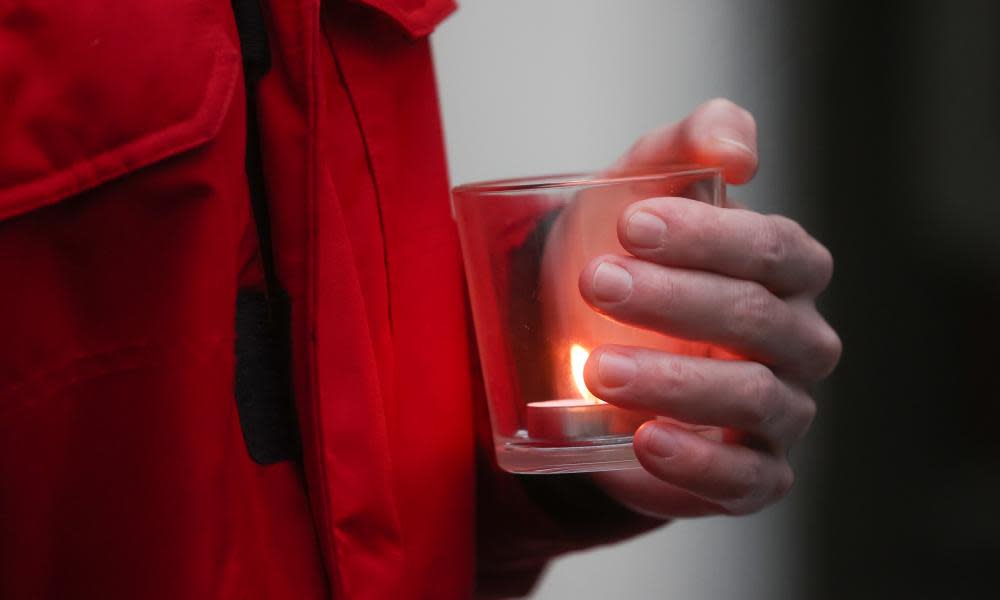Rights group’s closure is part of rapid dismantling of Russian civil society

Analysis: brief window when Russia would tolerate independent reckoning of its past appears to have closed
In a terrible year for human rights in Russia, beginning with the imprisonment of the opposition leader Alexei Navalny, the closure of International Memorial stands out for its ruthlessness.
Founded in the late 1980s by Andrei Sakharov and other Soviet-era dissidents, the group took the new freedoms offered under Mikhail Gorbachev and used them to reveal raw truths about the fate of millions of victims of Stalin’s repressions.
It was a poignant symbol of Russia’s new openness, but for many the meaning was anything but abstract: Russians discovered the tragic fates of their parents, grandparents and great-grandparents after decades of secrecy and official cowardice.
Memorial’s closure is also a potent symbol – one of Russian civil society being dismantled at lightning speed. Its leadership had hoped that public support, including from prominent Russians such as Gorbachev, would stay the Kremlin’s hand. Or that closing down an organisation dedicated to uncovering Soviet atrocities would be a step too far, even for Vladimir Putin.
But on Tuesday, almost exactly 30 years after the Soviet Union was dissolved, a judge showed otherwise.
“When Russia chose to take a democratic, legal path forward, I couldn’t in my darkest dreams have imagined that everything would eventually start going in reverse,” Nikita Petrov, a historian and researcher who helped found Memorial, told the Guardian last month. “Probably I was naive then.”
It is not hard to see how Putin, mired in historical conflicts over Crimea, Nato expansion and the fall of the Soviet Union, the second world war and more, sees investigation of Soviet history as a threat to national security. He is far more interested in perceived historical injustices committed against Russia than in the uncomfortable truths dug up by Memorial during the organisation’s three decades of work in the Russian archives.
“Our country needs an honest and conscientious understanding of the Soviet past; this is the key to its future,” the organisation wrote in a statement after its liquidation.
In place of Memorial, which spoke out eloquently and aggressively about mass atrocities, the state is creating a more manicured and careful presentation of the deaths of millions, one that condemns their deaths more than their murders, identifying victims but not their killers.
The Russian government would like to portray Memorial’s closure as a simple, bureaucratic extension of its “foreign agents” laws. But on Tuesday a prosecutor in court made the political motive explicit, saying in an impassioned speech that Memorial was “mendaciously portraying the USSR as a terrorist state”.
“Why should we, the descendants of the victors, have to see the vindication of traitors to their homeland and Nazi henchmen?” the prosecutor asked. A lawyer for Memorial said it reminded him of a 1930s show trial.
Memorial’s leadership has said it is useless trying to understand which of the government’s red lines it crossed to prompt the authorities to shut it down. Some believe it has to do with its archival and historical work on Soviet terror, others with its support for political prisoners such as Navalny.
Yet the truth is that Memorial has continued to do what it did since day one, while it is Russia that has changed again, perhaps ending a brief window when it would tolerate an independent reckoning of its past.
“It speaks to the fears of the government that it is no longer willing to tolerate the honest accounting of its conduct that Memorial provides,” said Kenneth Roth, the head of Human Rights Watch. “If that mirror is too awful to look at, the answer is to change the conduct, not to shatter the mirror.”

 Yahoo News
Yahoo News 
